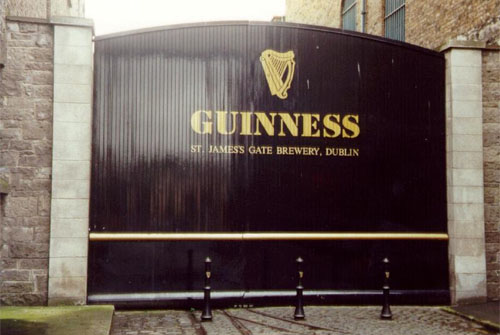Flann O’Brien hits it out: “Workman’s Friend” revisited.
by Dermot Trellis
Five years ago we posted an excerpt from At Swim-Two-Birds , a poem purportedly written by a Jem Casey called “Workman’s Friend.” O’Brien intended the poem coupled with the conversation around it as a parody of Irish pretension and bad Irish verse, something forgettable, and deservedly so. It is the subject of great interest and admiration to the three deadbeats, Furrisky, Lamont and Shanahan, who reappear throughout the novel.
Anne Clissmann is right to conclude that
“O’Brien’s Dublin is revealed as a city of useless talk, a place where anecdote parades as criticism, where the general is forever reduced to the particular, the familiar and, consequently, the trivial.” (Clissmann 119)
And yet O’Brien loved the city too, refusing to follow into exile Joyce and so many of his own contemporaries, not least Anthony Cronin, his unsympathetic and unimpressed rival and biographer.
Little about O’Brien has been predictable, not the subjects he wrote about or how he would write about them, whom he would savage or how he might react to current events. The arc of his legacy has been equally strange. His novels barely sold during his short lifetime, but “Cruiskeen Lawn,” his column in the Irish Times , was popular and, despite its madcap humor and misdirection, influential in political terms.
Cronin famously wondered whether it was the booze or the column that destroyed O’Brien; Cronin considered him a figure of unfulfilled potential, a failure whose fiction, while decent, should have been better.
In recent times the assessment has flipped. The novels are deservedly admired, but the bigger surprise is the revisionist view of “Cruiskeen Lawn” as an aggregate masterpiece. The greatest irony of all, however, involves “Workman’s Friend.” Far from disposable, it has endured as a gem of comic genius. Actor after actor has ‘performed’ it on stage and screen, and it almost certainly is the most frequently quoted passage from his voluminous body of work. O’Brien would have been bemused.
Our excerpt five years ago presented the ‘pome’ out of context as a freestanding item, and that was a mistake. It is both funnier and more scathing in the context of the conversation about it. Because the ‘Friend’ concerns beer, more particularly Guinness, and incidentally concerns bacon too, we will use its subject as a pretext for posting here at bfia.

“The name or title of the pome I am about to recite, gentlemen, said Shanahan with leisure priest-like in character, is a pome by the name of the ‘Workman’s Friend’. By God you can’t beat it. I’ve heard it praised by the highest. It’s a pome about a thing that’s known to all of us. It’s about a drink of porter.
Porter!
Up on your legs man, said Furrisky. Mr. Lamont and myself are waiting and listening. Up you get now.
Come on, off you go, said Lamont.
Now listen, said Shanahan clearing the way with small coughs. Listen now.
He arose holding out his hand and bending his knee beneath him on the chair.
When things go wrong and will not come right,
Though you do the best you can,
When life looks black as the hour of night--
A PINT OF PLAIN IS YOUR ONLY MAN.
By God there’s a lilt in that, said Lamont
Very good indeed, said Furrisky. Very nice.
I’m telling you it’s the business, said Shanahan. Listen now.
When Money’s tight and is hard to get
And your horse has also ran,
When all you have is a heap of debt--
A PINT OF PLAIN IS YOUR ONLY MAN.
When health is bad and your heart feels strange,
And your face is pale and wan,
When doctors say that you need a change,
A PINT OF PLAIN IS YOUR ONLY MAN.
There are things in that pome that make for what you call permanence. Do you know what I mean, Mr. Furrisky?
There’s no doubt about it, it’s a grand thing, said Furrisky. Come on, Mr. Shanahan, give us another verse. Don’t tell me that is the end of it.
Can’t you listen? said Shanahan?
When food is scarce and your larder bare
And no rashers grease your pan,
When hunger grows as your meals are rare--
A PINT OF PLAIN IS YOUR ONLY MAN.
What do you think of that now?
It’s a pome that’ll live, called Lamont, a pome that’ll be heard and clapped when plenty more….
But wait till you hear the last verse, man, the last polish-off, said Shanahan. He frowned and waved his hand.
Oh it’s good, it’s good, said Furrisky.
In time of trouble and lousy strife
You have still got a darlint plan,
You can still turn to a brighter life--
A PINT OF PLAIN IS YOUR ONLY MAN.
Did you ever hear anything like it in your life, said Furrisky. A pint of plain by God, what! Oh I’m telling you, Casey was a man in twenty thousand, there’s no doubt about that. He knew what he was at, too true he did. If he knew nothing else, he knew how to write a pome. A pint of plain is your only man.
Didn’t I tell you it was good? Said Shanahan. Oh by Gorrah you can’t cod me.
There’s one thing in that pome, permanence , if you know what I mean. That pome, I mean to say, is a pome that’ll be heard wherever the Irish race is wont to gather, it’ll live as long as there’s a hard root of an Irishman left by the Almighty on this planet, mark my words. What do you think, Mr. Shanahan?
It’ll live, Mr. Lamont, it’ll live.
I’m bloody sure it will, said Lamont.
A pint of plain, by God, eh? said Furrisky.”
(O’Brien 107-09)
Sources:
Anne Clissmann, Flann O’Brien: A critical introduction to his writings (Dublin 1975)
Flann O’Brien, At Swim-Two-Birds (New York 1966)

